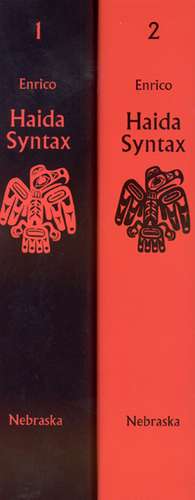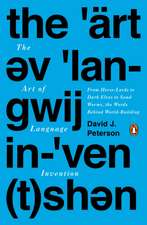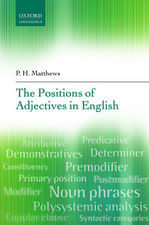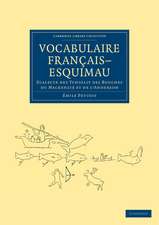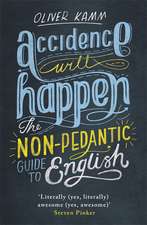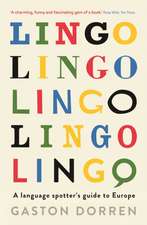Haida Syntax, 2-volume set: Studies in the Anthropology of North American Indians
Autor John Enricoen Limba Engleză Hardback – 31 mai 2003
The Haida people make their home on the Queen Charlotte Islands in British Columbia and on Prince of Wales Island off the coast of southern Alaska. Their language, distinct from their Northwest Coast neighbors, is spoken today by a few elders and is in danger of becoming extinct, despite efforts by the community to save it. Intimately familiar with the Haida language, John Enrico bases this comprehensive description of the syntax of two Haida dialects on his twenty-five years of fieldwork in the Haida community and on the materials collected by the anthropologist John Swanton in the early twentieth century. This synthesis of the syntax of the Haida language provides an exemplary reference work of the language for the Haida community and for scholars.
Din seria Studies in the Anthropology of North American Indians
-
 Preț: 107.00 lei
Preț: 107.00 lei -
 Preț: 201.73 lei
Preț: 201.73 lei -
 Preț: 128.48 lei
Preț: 128.48 lei -
 Preț: 236.78 lei
Preț: 236.78 lei -
 Preț: 262.10 lei
Preț: 262.10 lei - 8%
 Preț: 379.25 lei
Preț: 379.25 lei -
 Preț: 139.82 lei
Preț: 139.82 lei -
 Preț: 136.91 lei
Preț: 136.91 lei - 8%
 Preț: 390.99 lei
Preț: 390.99 lei -
 Preț: 253.56 lei
Preț: 253.56 lei -
 Preț: 364.94 lei
Preț: 364.94 lei -
 Preț: 299.73 lei
Preț: 299.73 lei -
 Preț: 191.36 lei
Preț: 191.36 lei -
 Preț: 225.46 lei
Preț: 225.46 lei -
 Preț: 110.08 lei
Preț: 110.08 lei - 15%
 Preț: 621.45 lei
Preț: 621.45 lei -
 Preț: 105.96 lei
Preț: 105.96 lei -
 Preț: 105.96 lei
Preț: 105.96 lei - 8%
 Preț: 393.82 lei
Preț: 393.82 lei -
 Preț: 168.32 lei
Preț: 168.32 lei -
 Preț: 310.79 lei
Preț: 310.79 lei -
 Preț: 367.34 lei
Preț: 367.34 lei - 8%
 Preț: 511.78 lei
Preț: 511.78 lei -
 Preț: 470.60 lei
Preț: 470.60 lei - 8%
 Preț: 508.57 lei
Preț: 508.57 lei -
 Preț: 169.07 lei
Preț: 169.07 lei -
 Preț: 203.00 lei
Preț: 203.00 lei -
 Preț: 508.80 lei
Preț: 508.80 lei - 15%
 Preț: 460.86 lei
Preț: 460.86 lei - 15%
 Preț: 513.69 lei
Preț: 513.69 lei -
 Preț: 103.31 lei
Preț: 103.31 lei -
 Preț: 296.68 lei
Preț: 296.68 lei - 15%
 Preț: 547.32 lei
Preț: 547.32 lei -
 Preț: 129.30 lei
Preț: 129.30 lei -
 Preț: 201.48 lei
Preț: 201.48 lei -
 Preț: 498.97 lei
Preț: 498.97 lei - 15%
 Preț: 533.36 lei
Preț: 533.36 lei -
 Preț: 429.67 lei
Preț: 429.67 lei - 15%
 Preț: 451.70 lei
Preț: 451.70 lei -
 Preț: 124.34 lei
Preț: 124.34 lei -
 Preț: 474.45 lei
Preț: 474.45 lei -
 Preț: 390.32 lei
Preț: 390.32 lei - 15%
 Preț: 486.96 lei
Preț: 486.96 lei
Preț: 1168.84 lei
Preț vechi: 1425.42 lei
-18% Nou
Puncte Express: 1753
Preț estimativ în valută:
223.65€ • 233.53$ • 184.69£
223.65€ • 233.53$ • 184.69£
Carte disponibilă
Livrare economică 25 martie-08 aprilie
Preluare comenzi: 021 569.72.76
Specificații
ISBN-13: 9780803218222
ISBN-10: 0803218222
Pagini: 1387
Ilustrații: Map
Dimensiuni: 150 x 250 x 15 mm
Greutate: 2.17 kg
Ediția:New.
Editura: Nebraska
Colecția University of Nebraska Press
Seria Studies in the Anthropology of North American Indians
Locul publicării:United States
ISBN-10: 0803218222
Pagini: 1387
Ilustrații: Map
Dimensiuni: 150 x 250 x 15 mm
Greutate: 2.17 kg
Ediția:New.
Editura: Nebraska
Colecția University of Nebraska Press
Seria Studies in the Anthropology of North American Indians
Locul publicării:United States
Notă biografică
John Enrico, an independent scholar, is the author of The Lexical Phonology of Masset Haida, editor and translator of Skidegate Haida Myths and Histories, and coauthor (with Wendy Bross Stuart) of Northern Haida Songs (Nebraska 1996). He is currently working on a dictionary of the three extant Haida dialects.
Recenzii
"Haida Syntax makes an enormous contribution to our understanding of the syntax and semantics of Haida. There is very little published material available on this language, and in this book John Enrico brings together a rich range of syntactic and semantic material on the language. . . . A book of this magnitude will make Haida one of the syntactically best described languages."—Keren Rice, author of Morpheme Order and Semantic Scope: Word Formation in the Athapaskan Verb
"One of the most valuable features of Haida Syntax is the semantic detail that is given regarding verbs, constructions, etc. This will be immensely useful to linguists of all theoretical persuasions, as they try their hand at analyzing this fascinating language within their own theoretical framework. Also, the extensive discussion of focus and its role within the grammar is very valuable."—Robert D. Van Valin, author of An Introduction to Syntax
"Thanks to the long-term research program of John Enrico, the Haida language of the Queen Charlotte Islands will be one of the best documented indigenous languages of North America. . . . There is exceptional depth and breadth to Enrico's research program. . . . [a] massively exemplified and annotated study."—James Kari, Journal of Anthropological Research
